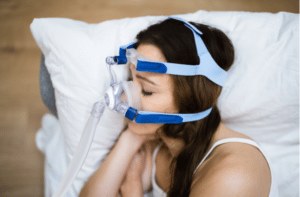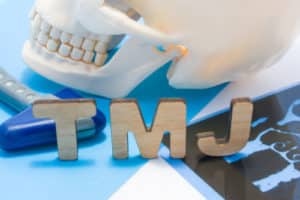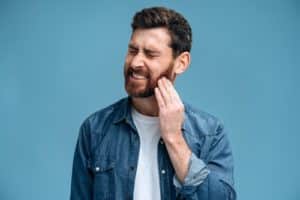
Common Symptoms of TMD
Are you having jaw pain that seems to never go away? You may have heard of TMD or TMJ and started to wonder, “Is that what’s going on?’” TMD, also commonly known as TMJ, stands for temporomandibular disorder. The temporomandibular joint is the source of symptoms and pain for people suffering from TMD. Let’s take a look at some of the common symptoms and signs of TMD, so you know when it’s time to seek TMD treatment.
What Is TMD?
TMD is when the temporomandibular joint becomes irritated or inflamed. The TMJ connects your lower jaw to the skull and can get irritated from an improper bite, arthritis, and physical trauma. TMD affects muscles around the jaw and can be very painful. TMD lasts anywhere from days to months and can be recurring depending on the root cause.
Signs and Symptoms of TMD
Jaw Pain
Jaw pain is the most common symptom of TMJ and is one of the most debilitating. Pain can come from the joint itself or from tight muscles around the jaw. The pain can feel like aching, burning, tightness, or even sharp pain.
Teeth Problems
Teeth issues are a common sign and cause of TMD. Tightened muscles and grinding can lead to damaged and sore teeth.
Issues With Sleeping
The pain, tightness, and grinding of teeth can, unfortunately, lead to issues with sleep. These problems can make it hard to fall asleep and stay asleep.
Headaches
Muscle tightness, grinding, and excessive jaw movement can lead to headaches caused by TMD. The headaches can be similar to other tension headaches. This makes TMD headaches hard to identify without other symptoms present.
Seeking Treatment
Many of the things that cause TMD actually stem from your teeth. That’s why Dr. Ania Mohelicki, DDS, provides services to help alleviate TMD and its symptoms. Dr. Ania understands that TMD is a complex issue and will develop a treatment plan for your situation. Dr. Ania and her team make it their mission to provide you with quick, comfortable, and effective treatments for your TMD. Let Dr. Ania’s results speak for themselves, and contact her office at (303) 443-0998 today.



 A straighter smile is a common goal for many patients who visit the office of Dr. Ania Mohelicki of Boulder, CO.
A straighter smile is a common goal for many patients who visit the office of Dr. Ania Mohelicki of Boulder, CO.  If you feel as though you are not getting enough sleep every night, even if you’re spending sufficient time in bed, you may be unaware that you are competing against a condition known as obstructive sleep apnea. This sleep disorder, sometimes referred to as OSA, can cause you to cease breathing hundreds of times in one night. This results in insufficient rest to feel energized and focused the following day. Dr. Ania Mohelicki and her team in Boulder, CO, can help you find a reliable and comfortable solution to OSA with
If you feel as though you are not getting enough sleep every night, even if you’re spending sufficient time in bed, you may be unaware that you are competing against a condition known as obstructive sleep apnea. This sleep disorder, sometimes referred to as OSA, can cause you to cease breathing hundreds of times in one night. This results in insufficient rest to feel energized and focused the following day. Dr. Ania Mohelicki and her team in Boulder, CO, can help you find a reliable and comfortable solution to OSA with  At the practice of Dr. Ania Mohelicki, new and current patients of her Boulder, CO, area office will find that she provides a wide range of services for individuals who have oral health concerns. One condition that might be overlooked is that of
At the practice of Dr. Ania Mohelicki, new and current patients of her Boulder, CO, area office will find that she provides a wide range of services for individuals who have oral health concerns. One condition that might be overlooked is that of  With the turn of the calendar, it’s a brand-new year–and time to think about what you’d like to change or improve in 2023. Dr. Ania Mohelicki and her team in Boulder, CO, help patients achieve beautiful, healthy smiles, and if you struggle with imperfections of the teeth and gums, you may be a great candidate for cosmetic dentistry. With the help of our dental professionals, you can rejuvenate or completely change your smile with
With the turn of the calendar, it’s a brand-new year–and time to think about what you’d like to change or improve in 2023. Dr. Ania Mohelicki and her team in Boulder, CO, help patients achieve beautiful, healthy smiles, and if you struggle with imperfections of the teeth and gums, you may be a great candidate for cosmetic dentistry. With the help of our dental professionals, you can rejuvenate or completely change your smile with  When it comes to caring for your smile, your dentist may recommend preventative care. If you have experienced tooth loss, however, you will need to learn more about the tooth replacement options available to you. Dr. Ania Mohelicki and her team in Boulder, CO, work directly with patients to help them in achieving the smile they’ve always wanted, even when problems develop.
When it comes to caring for your smile, your dentist may recommend preventative care. If you have experienced tooth loss, however, you will need to learn more about the tooth replacement options available to you. Dr. Ania Mohelicki and her team in Boulder, CO, work directly with patients to help them in achieving the smile they’ve always wanted, even when problems develop. You probably know that you should see the dentist regularly to maintain a healthy smile. But why? What happens if you don’t maintain your routine evaluations and cleanings with Dr. Ania Mohelicki and her team in Boulder, CO? Let’s talk more about conditions that can impact the smile and how often you should
You probably know that you should see the dentist regularly to maintain a healthy smile. But why? What happens if you don’t maintain your routine evaluations and cleanings with Dr. Ania Mohelicki and her team in Boulder, CO? Let’s talk more about conditions that can impact the smile and how often you should  Your
Your 
